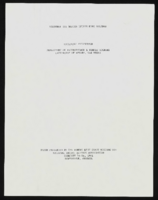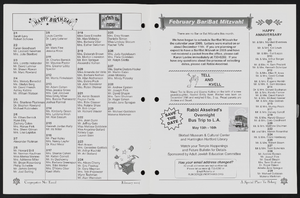Search the Special Collections and Archives Portal
Search Results

"Arizona: The Martin Luther King Holiday": paper by Roosevelt Fitzgerald
Date
Archival Collection
Description
From the Roosevelt Fitzgerald Professional Papers (MS-01082) -- Unpublished manuscripts file. Presented at 5th Annual West Coast Meeting of National Social Science Association, Scottsdale, Arizona.
Text

Drug laws: reports, analysis, House Resolution 5484, status, correspondence, clippings, press release, statement from Senator Hecht, and notes
Date
Archival Collection
Description
Folder of documents from the Senator Chic Hecht Political Papers (MS-00003) -- Subject Files -- Judiciary file.
Text

Daniel Tafoya oral history interview: transcript
Date
Archival Collection
Description
Oral history interview with Daniel Tafoya conducted by Laurents Bañuelos-Benitez and Barbara Tabach on December 12, 2018 for the Latinx Voices of Southern Nevada Oral History Project. In this interview, Tafoya discusses his early life in Albuquerque, New Mexico. He talks about his father's life story, his educational experience with learning disabilities, and joining the United States Air Force. Tafoya describes his career in the military, and being stationed at Nellis Airforce Base. Lastly, Tafoya discusses with involvement with the Clark County School District (CCSD) and with the Latin Chamber of Commerce.
Text

Transcript of interview with Renee Marchant Rampton by Dr. Caryll Batt Dziedziak, September 25, 2015
Date
Archival Collection
Description
Renee Marchant Rampton has often referred to herself as "One of Fifteen." Indeed, growing up in a family of fifteen children, Renee experienced the care of loving parents, the excitement of a bustling household, and the engagement of an active Church; all amidst the strains of a depression era economy. Renee's mother, Beatrice Marchant, provided Renee with a strong role model with which to emulate; a disciplined woman, who rose to the task without hesitation. Beatrice became the family's provider after her husband's debilitating stroke and later served in the Utah Legislature during the 1970s. Renee loved music from an early age. As a young child she found an early job as a piano accompanist for a dance studio. In 1956 she married musician, Roger Rampton, a successful percussionist. They soon settled in Las Vegas, where Roger performed on the Strip and they began raising their four children. It was an exciting period in Las Vegas history as the Strip attracted musicians and
Text

Transcript of interview with Sydney Wickliffe by Claytee White, February 1, 2013
Date
Archival Collection
Description
Sydney Wickliffe, nee Botkin, was born in Long Beach, California in 1944. Her parents, Donald and Betty Botkin, moved their young family first to Denver and then to the small town of Ulysses, Kansas before heading for Las Vegas in 1952, when Sydney was eight years old. Since then, she has called Las Vegas her home, graduating from Rancho High School's inaugural senior class in 1962. Growing up in a growing city, Sydney combined an active youth with long hours working in her father's North Las Vegas pharmacy and, later, would earn her degree in accounting from UNLV. As a CPA, she worked as an auditor for the Gaming Control Board and, in 1987, was promoted to deputy chief. From there, she took on the challenging role of director in Nevada's Department of Business and Industry as a member of Governor Kenny Guinn cabinet. As she says, even "one of the north-town girls" can go a long way - and in this interview, she shares memories that help us all see what the Las Vegas she remembers was like in the 1950s and 60s and how it helped to shape the person she is today.
Text

Transcript of interview with Charles W. Hunsberger by Stefani Evans and Claytee White, July 27, 2016
Date
Archival Collection
Description
It seems counterintuitive that a man who was raised a Mennonite, spoke Pennsylvania Dutch before he spoke English, and was destined to quit school after eighth grade to work on the family farm would grow up to become one of the most progressive and visionary library directors in the United States. His participation in the Building Las Vegas project results from his being responsible for building twenty libraries in Clark County during his 1971–1994 tenure as director of the Las Vegas-Clark County Library District. One of his first controversies was to insist on going to high school after his father demanded he quit. After graduating high school he went to Nigeria on behalf of his church, serving there for five years. Upon returning to the U.S., he found work at the Fort Wayne Library, albeit he was limited by how far he could advance because of his limited education. After attaining his library degree Indiana University at Bloomington he served as director at the Columbia City Library
Text

Transcript of interview with Patricia Ross by Judy Harrell, March 19, 2014
Date
Archival Collection
Description
Patty Ann Drew’s life experiences capture large movements in Las Vegas history: mob-dominated gambling, the Helldorado Rodeo, explosive growth, medical advances, and Clark County School District’s Sixth Grade Centers—all in a desert city centered in the Mormon Culture Region. Patty arrived in Las Vegas as an infant with her parents and older brothers in 1944 and was raised in the Huntridge area, where she and her brothers attended John S. Park Elementary School and matriculated from there to Las Vegas High School. In this interview, Patty talks about her parents working on the Strip, her school days, joining the Church of Jesus Christ of Latter-day Saints, marrying her high school sweetheart, and becoming a young mother in Las Vegas. After Patty married her second husband, Thomas Ross, the couple built a house west of Jones Boulevard and Patty gave birth to her third son. In addition, she returned to school to earn her Bachelor’s and Master’s degrees and taught at C. H. Decker Elementary School for twenty years.
Text

Transcript of interview with Lee Cagley by Claytee D. White and Stefani Evans, August 08, 2016
Date
Archival Collection
Description
Lee Cagely, an interior designer and professor who designed some of the most iconic hotels in Las Vegas, Nevada, was born in the Panama Canal Zone on January 31, 1951. His father Leo was a civil engineer for the Panama Canal Company and his mother Charlotte worked as a receptionist. After his father left his job in Panama, Lee spent his childhood in Dallas, Texas; Tulsa, Oklahoma; and Des Moines, Iowa. He started to attend Rice University for architecture, but he chose to leave before completing his degree. He returned to college a few years later and graduated from Iowa State University with a degree in interior design in 1975. While his first California jobs were in restaurant design, he quickly moved on to airports and hotels and moved to Las Vegas in 1990 after associating with Marnell Architecture. Cagley is known for his designs in the Rio All-Suite Hotel and Casino, Ceasars Palace Atlantic City, the Mirage, and the Bellagio Resort & Casino. He is currently Chair of the Iowa State University College of Design and is principal designer for Lee Cagely Design. Here, Cagley explains the importance of keeping the various pieces of the infrastructure of a resort—including landscape architecture, architecture, interior design, all kinds of HVAC [heating, ventilation and air conditioning] concerns, housekeeping, food service, maintenance, etc.-invisible in order to maximize the visitor experience. At the same time he illustrates through several examples how resort design does not happen in a vacuum-it is instead part of a complex team that works together to create the whole. He also describes the challenges the Las Vegas resort industry finds in creating the very best visitor experience for a broad range of groups-from Millennials to their Boomer grandparents and all the generations in between.
Text


